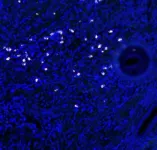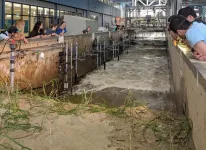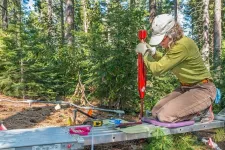(Press-News.org) People in the earliest stage of Alzheimer’s disease — after brain changes have begun but before cognitive symptoms become apparent — harbor an assortment of bacteria in their intestines that differs from the gut bacteria of healthy people, according to a study by researchers at Washington University School of Medicine in St. Louis.
The findings, published June 14 in Science Translational Medicine, open up the possibility of analyzing the gut bacterial community to identify people at higher risk of developing dementia, and of designing microbiome-altering preventive treatments to stave off cognitive decline.
“We don’t yet know whether the gut is influencing the brain or the brain is influencing the gut, but this association is valuable to know in either case,” said co-corresponding author Gautam Dantas, PhD, the Conan Professor of Laboratory and Genomic Medicine. “It could be that the changes in the gut microbiome are just a readout of pathological changes in the brain. The other alternative is that the gut microbiome is contributing to Alzheimer’s disease, in which case altering the gut microbiome with probiotics or fecal transfers might help change the course of the disease.”
The idea of studying the connection between the gut microbiome and Alzheimer’s disease came together at a youth soccer game, where Dantas and Beau M. Ances, MD, PhD, the Daniel J. Brennan Professor of Neurology, chatted while their children played. Ances treats and studies people with Alzheimer’s disease; Dantas is an expert on the gut microbiome.
Scientists already knew that the gut microbiomes of people with symptomatic Alzheimer’s differ from the microbiomes of healthy people of the same age. But, Ances told Dantas, nobody had yet looked at the gut microbiomes of people in the critical pre-symptomatic phase.
“By the time people have cognitive symptoms, there are significant changes that are often irreversible,” said Ances, the other co-corresponding author. “But if you can diagnosis someone very early in the disease process, that would be the optimal time to effectively intervene with a therapy.”
During the early stage of Alzheimer’s disease, which can last two decades or more, affected people accumulate clumps of the proteins amyloid beta and tau in their brains, but do not exhibit signs of neurodegeneration or cognitive decline.
Dantas, Ances and first author Aura L. Ferreiro, PhD, then a graduate student in Dantas’ lab and now a postdoctoral researcher, evaluated participants who volunteer for studies at the Charles F. and Joanne Knight Alzheimer Disease Research Center at Washington University. All participants were cognitively normal. As part of this study, participants provided stool, blood and cerebrospinal fluid samples; kept food diaries; and underwent PET and MRI brain scans.
To distinguish participants already in the early stage of Alzheimer’s disease from those who were healthy, the researchers looked for signs of amyloid beta and tau accumulation through brain scans and cerebrospinal fluid. Of the 164 participants, about a third (49) had signs of early Alzheimer’s.
An analysis revealed that healthy people and people with preclinical Alzheimer’s disease have markedly different gut bacteria — in terms of the species of bacteria present and the biological processes in which those bacteria are involved — despite eating basically the same diet. These differences correlated with amyloid and tau levels, which rise before cognitive symptoms appear, but did not correlate with neurodegeneration, which becomes evident about the time cognitive skills start to decline. These differences potentially could be used to screen for early Alzheimer’s disease, the researchers said.
“The nice thing about using the gut microbiome as a screening tool is its simplicity and ease,” Ances said. “One day individuals may be able to provide a stool sample and find out if they are at increased risk for developing Alzheimer’s disease. It would be much easier and less invasive and more accessible for a large proportion of the population, especially underrepresented groups, compared to brain scans or spinal taps.”
The researchers have launched a five-year follow-up study designed to figure out whether the differences in the gut microbiome are a cause or a result of the brain changes seen in early Alzheimer’s disease.
“If there is a causative link, most likely the link would be inflammatory,” said Dantas, who is also a professor of pathology & immunology, of biomedical engineering, of molecular microbiology and of pediatrics. “Bacteria are these amazing chemical factories, and some of their metabolites affect inflammation in the gut or even get into the bloodstream, where they can influence the immune system all over the body. All of this is speculative at this point, but if it turns out that there is a causal link, we can start thinking about whether promoting ‘good’ bacteria or getting rid of ‘bad’ bacteria could slow down or even stop the development of symptomatic Alzheimer’s disease.”
END
Altered gut bacteria may be early sign of Alzheimer’s disease
Gut microbes of people with pre-symptomatic Alzheimer’s differ from those of healthy people
2023-06-14
ELSE PRESS RELEASES FROM THIS DATE:
Elimination of type of bacteria suggests treatment for endometriosis
2023-06-14
A research group from the Graduate School of Medicine and iGCORE at Nagoya University in Japan, has discovered that using an antibiotic to target Fusobacterium reduced the formation of lesions associated with endometriosis, a gynecological disorder characterized by endometrial tissue usually found inside the uterus being found outside it. Their findings suggest an alternative treatment for this disorder. The study was published in Science Translational Medicine.
Endometriosis affects one in ten women between the ages of 15 and 49. The disorder can cause lifelong health problems, including pelvic pain and infertility. ...
Newly planted vegetation accelerates dune erosion during extreme storms, research shows
2023-06-14
CORVALLIS, Ore. – Newly planted vegetation on coastal sand dunes can accelerate erosion from extreme waves, a study involving researchers from the Oregon State University College of Engineering suggests.
The authors note the findings run counter to the widely accepted paradigm that vegetation always acts to reduce erosion on dunes, the first line of storm defense for landscapes that are among the world’s most ecologically important and economically valuable.
The experiments involved building beach dune profiles 70 meters long and 4.5 meters high and subjecting ...
Preserving forests to protect deep soil from warming
2023-06-14
A recent study led by scientists at Lawrence Berkeley National Laboratory (Berkeley Lab) and the University of Zurich has revealed that the organic compounds proposed for carbon sequestration in deep soil are highly vulnerable to decomposition under global warming.
The finding has implications for a key strategy in carbon management that relies on soil and forests – natural carbon “sinks” – to mitigate global warming.
About 25 percent of global carbon emissions are captured by forests, grasslands, and rangelands. During photosynthesis, plants store carbon in their cell walls and in the soil. Because ...
Treatment creates steel alloys with superior strength and plasticity
2023-06-14
WEST LAFAYETTE, Ind. — A new treatment tested on a high-quality steel alloy produces extraordinary strength and plasticity, two traits that must typically be balanced rather than combined. Ultra-fine metal grains that the treatment produced in the outermost layer of steel appear to stretch, rotate and then elongate under strain, conferring super-plasticity in a way that Purdue University researchers cannot fully explain.
The researchers treated T-91, a modified steel alloy that is used in nuclear and petrochemical ...
TCT 2023 Program Guide now available
2023-06-14
NEW YORK – June 14, 2023 – The Cardiovascular Research Foundation (CRF) has announced the TCT 2023 Program Guide is now available. TCT is the annual scientific symposium of CRF and the world’s premier educational meeting specializing in interventional cardiovascular medicine. TCT 2023 will take place October 23-26 in San Francisco, California, at the Moscone Center and will celebrate 35 years of leading the field.
Every year, TCT features major medical research breakthroughs and gathers ...
Plate tectonics not required for the emergence of life
2023-06-14
Scientists have taken a journey back in time to unlock the mysteries of Earth’s early history, using tiny mineral crystals called zircons to study plate tectonics billions of years ago. The research sheds light on the conditions that existed in early Earth, revealing a complex interplay between Earth’s crust, core, and the emergence of life.
Plate tectonics allows heat from Earth’s interior to escape to the surface, forming continents and other geological features necessary for life to emerge. Accordingly, “there has been the assumption that plate tectonics is necessary for life,” says John Tarduno, who teaches in the Department ...
Novel research shows older breast cancer survivors experience accelerated aging, worse functional outcomes
2023-06-14
For Immediate Release
Contact
Colleen McDonald
Sr. Consultant, Earned Media - MCW
414.801.3146 | cmcdonald@mcw.edu
Milwaukee, Wis., June 14, 2023 – In a new multi-center study, researchers from the Medical College of Wisconsin (MCW) joined with leading cancer centers from across the nation to examine whether cancer and its treatments accelerate aging. Using novel epigenetic measures to assess biological aging, investigators found that older breast cancer survivors – particularly those exposed to chemotherapy – showed greater epigenetic aging than their same-aged peers without cancer, which ...
The life below our feet: team discovers microbes thriving in groundwater and producing oxygen in the dark
2023-06-14
WOODS HOLE, Mass. – Nearly a third of Earth’s freshwater resources lie in groundwater – much more than in all lakes, rivers and the atmosphere combined, and exceeded only by the frozen water in polar ice caps. Accordingly, about half of humankind depends on groundwater as a source of drinking water.
Despite the global occurrence and essential importance of groundwater, however, knowledge of the organisms that inhabit it, and how they survive, remains thin.
A recent investigation led by microbial ecologist Emil Ruff of the Marine Biological Laboratory (MBL) has discovered ...
IEEE Photonics Society in search for Editor-in-Chief
2023-06-14
The IEEE Photonics Society invites applications and nominations for the volunteer position of Editor-in-Chief (EiC) for the IEEE Photonics Journal, delivered through IEEE’s research digital library IEEE Xplore. The term for the current EiC will end this year and the Society is conducting an open search for potential candidates.
“The IEEE Photonics Journal led the way for the IEEE, being the IEEE’s first open access journal. We’re excited to find a candidate who can lead this pioneering journal for the next term, and I encourage all qualified ...
Gemini North detects multiple rock-forming elements in the atmosphere of a scorching exoplanet
2023-06-14
WASP-76b is a strange world. Located 634 light-years from Earth in the direction of the constellation of Pisces, the Jupiter-like exoplanet orbits its host star at an exceptionally close distance — approximately 12 times closer than Mercury is to the Sun — which heats its atmosphere to a searing 2000°C. Such extreme temperatures have “puffed up” the planet, increasing its volume to nearly six times that of Jupiter.
At such extreme temperatures, mineral- and rock-forming elements, which would otherwise remain hidden in the atmosphere of a colder gas-giant planet, can reveal themselves.
Using ...
LAST 30 PRESS RELEASES:
Cell and gene therapy across 35 years
Rapid microwave method creates high performance carbon material for carbon dioxide capture
New fluorescent strategy could unlock the hidden life cycle of microplastics inside living organisms
HKUST develops novel calcium-ion battery technology enhancing energy storage efficiency and sustainability
High-risk pregnancy specialists present research on AI models that could predict pregnancy complications
Academic pressure linked to increased risk of depression risk in teens
Beyond the Fitbit: Why your next health tracker might be a button on your shirt
UCSB scientists bottle the sun with liquid battery
Lung cancer drug offers a surprising new treatment against ovarian cancer
When consent meets reality: How young men navigate intimacy
Siemens Healthineers and Mayo Clinic expand strategic collaboration to enhance patient care through advanced technology
Physicists develop new protocol for building photonic graph states
OHSU-led research initiative examines supervised psilocybin
New review identifies pathways for managing PFAS waste in semiconductor manufacturing
New research finds state-level abortion restrictions associated with increased maternal deaths
New study assesses potential dust control options for Great Salt Lake
Science policy education should start on campus
Look again! Those wrinkly rocks may actually be a fossilized microbial community
Exposure to intense wildfire smoke during pregnancy may be linked to increased likelihood of autism
Children with Crohn’s have distinct gut bacteria from kids with other digestive disorders
Genomics offers a faster path to restoring the American chestnut
Caught in the act: Astronomers watch a vanishing star turn into a black hole
Why elephant trunk whiskers are so good at sensing touch
A disappearing star quietly formed a black hole in the Andromeda Galaxy
Yangtze River fishing ban halts 70 years of freshwater biodiversity decline
Genomic-informed breeding approaches could accelerate American chestnut restoration
How plants control fleshy and woody tissue growth
Scientists capture the clearest view yet of a star collapsing into a black hole
New insights into a hidden process that protects cells from harmful mutations
Yangtze River fishing ban halts seven decades of biodiversity decline
[Press-News.org] Altered gut bacteria may be early sign of Alzheimer’s diseaseGut microbes of people with pre-symptomatic Alzheimer’s differ from those of healthy people






